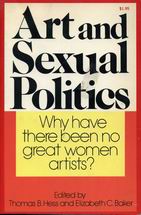
Art and Sexual Politics
Why Have There No Great Women Artists?
Hess, Thomas B.; Baker, Elizabeth C.
Publisher: Collier Books, New York, USA
Year Published: 1973
Pages: 150pp Resource Type: Book
Cx Number: CX11921
Examines cultural and ideological biases about female artists
Abstract:
One question unifies the collection of essays presented in Art and Sexual Politics: Why have there been no great women artists? Linda Nochlin, the author who initially presents what she refers to as "the women question," writes that answering such a complex question could examine every existing assumption in art. She believes that a feminist critique of art history could identify the discipline's cultural and ideological biases about female artists, and examine the most significant questions of art history in revolutionary new ways. Furthermore, that which could be learnt from the women question's application to the politics of art could potentially challenge gender divisions in other intellectual fields such as history, social science, and literature.
Nochlin argues that simply supporting female artists and attempting to justify their "greatness" would not sufficiently answer the women question, and could potentially reinforce the conviction that the greatness of women artists is questionable in the first place. She also does not believe that female artists are "great" in a way qualitatively different from male artists. Instead, she states that women merely do not receive the same institutional recognition that men do. Ideas such as the "Golden Nugget of Artistic Genius" ignore arguably more significant factors in artists' lives, such as social castes and institutional prejudices. The 19th century idea that a woman should be good at a great many things, so that "she may render herself generally useful," but that she should not focus on one thing or she might "remain incapable [in every other field]" also could have contributed to the shortage of great women artists.
The essays contained in this book all attempt to stress the institutional rather than the individual reasons why artists were considered great. By revealing these effects, Nochlin hoped that new institutions could be created in which "clear thought and true greatness [could be] challenges open to anyone."
[Abstract by Oliver Mao]
Subject Headings


